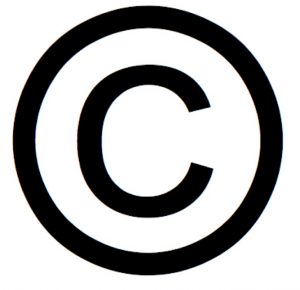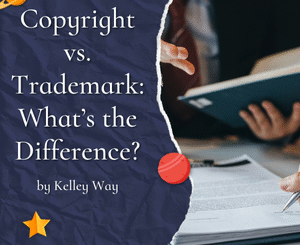How to Register a Copyright
 Welcome to the monthly column on literary law. Today we focus on how to register a copyright — from our monthly guest columnist, Kelley Way, a lawyer specializing in literary law. If you have general questions for Kelley on contracts or other aspects of literary law, be sure to comment below. Thanks!
Welcome to the monthly column on literary law. Today we focus on how to register a copyright — from our monthly guest columnist, Kelley Way, a lawyer specializing in literary law. If you have general questions for Kelley on contracts or other aspects of literary law, be sure to comment below. Thanks!
PS. A list of books on literary law can be found here.
PPS. For more on copyright, visit the U.S. Copyright Office.
And now for a bit of necessary legalese: Please note that this article does not constitute legal advice, and that an attorney-client relationship is not formed by reading the article or by commenting thereon.
***
I’ve been asked several times to help someone register his or her copyright. At the risk of inciting the wrath of my fellow copyright attorneys, I’ll put in print what I’ve told these people: while I’m happy to do so, you don’t need an attorney to file a copyright. In fact, you don’t need any help at all. All you need to do is go to the Copyright Office’s website (http://www.copyright.gov/eco/) and follow their instructions. I could finish this article now, but it just doesn’t seem right to leave it at a single paragraph, so I’ll outline the process of registration.
But first, why should anyone bother to register a copyright? Under the new Copyright Act, the copyright exists as soon as the work is written (or otherwise fixed; see my article “What is Copyright”); you are no longer required to register in order to have a copyright. Even so, it’s a good idea. Registering lets the rest of the world know that the work has a copyright, and it makes it easier for people who want permission to borrow from or adapt your work to find you. In addition, you are required to register your work before you can initiate an infringement suit, and registering before the suit begins allows you to ask for, and receive, statutory damages (i.e. fines imposed by law, regardless of the damage actually done to you).
So, now that we’ve established that registration is a good idea, here’s how you go about it (again, the Copyright Office has a tutorial explaining this – http://www.copyright.gov/eco/eco-tutorial.pdf):
First, you need to create an account, complete with username and password, if you haven’t already done so. Then you click the link on the left-hand side of the page to register a new claim. There’s one more page, where you can either get information on each step or start registration, before you get to the actual application.
The application is a series of screens asking for information about the work being registered. The Copyright Office wants to know:
- What type of work is being registered (as book authors, you’d be registering a literary work);
- The title;
- The year the work was completed, whether it’s been published, and if so, when and where;
- The author’s, or authors’, name(s), citizenship, and contribution (as fiction authors, you’d likely only check the “text” box);
- Who is claiming the copyright (that would be you, the author, unless the copyright has been transferred), and the claimant’s address;
- Any limitations to the claim (i.e. whether the work draws from or is based on someone else’s work; for example, you would fill this out if you included someone else’s poetry or photographs);
- Who to contact for permission to use the work (this is optional, and you can designate someone for this), and his or her contact information
- Who the Copyright Office should contact about the application, and his or her contact information
- Where and to whom to mail the registration certificate
- Whether any special handling is needed on this application (this is expensive, so don’t fill it out unless it really is necessary)
Once you’ve filled out these screens, you certify the application, review your information, and submit. Then you make an online payment (the current fee is $35), and arrange to send the Copyright Office a copy of your work. Under certain circumstances, such as the work being unpublished or only published electronically, you can upload an electronic copy; otherwise you have to mail a copy to the Copyright Office.
And that, in a nutshell, is how you register your copyrighted work. It may be a little confusing without a visual, so I would encourage you to go to the link provided above and look at the tutorial, which includes screenshots of each step. If you have any other questions, comments or suggestions for future posts, please email me or make use of the comment section below.
***
ABOUT THE AUTHOR
 Kelley Way was born and raised in Walnut Creek, California. She graduated from UC Davis with a B.A. in English, followed by a Juris Doctorate. Kelley is a member of the California Bar, and an aspiring writer of young adult fantasy novels. She can be contacted at KelleyAWay@gmail.com.
Kelley Way was born and raised in Walnut Creek, California. She graduated from UC Davis with a B.A. in English, followed by a Juris Doctorate. Kelley is a member of the California Bar, and an aspiring writer of young adult fantasy novels. She can be contacted at KelleyAWay@gmail.com.






